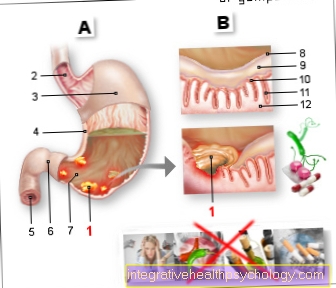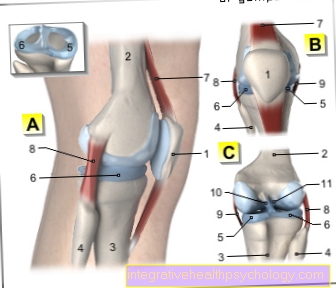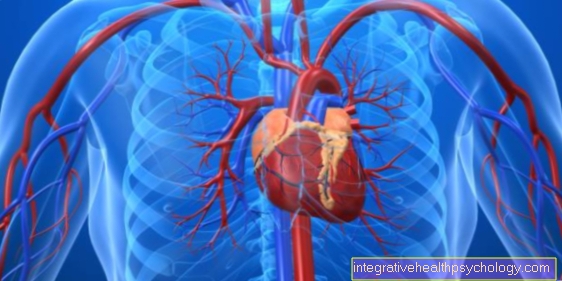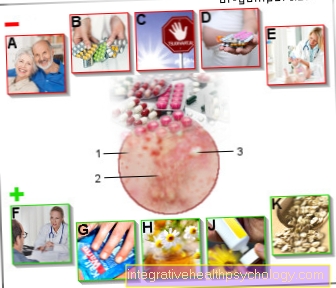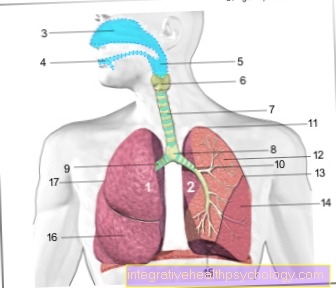Learning disability
Introduction - What is a learning disability?
We have been using the term “learning disability” in German since the 1960s. Learning disabilities are still controversially defined today and there have been numerous attempts to define the term in the last few decades. The definition of the pedagogue Gustav Otto Kanter, who understands the learning disability as a “long-lasting, serious and extensive failure in school performance”, is considered plausible. Kanter assumes that those affected are impaired in their intelligence.
Read more about the topic of learning disabilities in children here

What is the IQ like with a learning disability?
The intelligence quotient, IQ, is a value that is determined with the help of an intelligence test and is intended to quantify the intellectual performance, i.e. the intelligence of a person. An average IQ value is 100. A learning disability, also known as aptitude, is defined as an IQ value between 70 and 84.
What symptoms can I use to recognize a learning disability?
It is not always easy to identify and correctly diagnose a learning disability. Nevertheless, certain signs often appear in the case of a learning disability. Those affected often behave very passively and unconsciously make themselves psychologically dependent on other people. This means that people with learning disabilities are dependent on care and protection.
A typical symptom of a learning disability is a low tolerance for frustration. Those affected can attract attention through impaired control of their own impulses, for example through aggressive behavior or self-harm. In addition, people with learning disabilities often stand out due to their reduced adaptability in everyday life. They often have problems with both verbal and non-verbal communication. This can make living together much more difficult, as those affected often have difficulty making themselves understood and at the same time have serious problems understanding. Sufferers can have difficulty completing simple tasks, which often affects their social development. This can lead to abnormalities such as adjustment disorders, abnormal behavior and possibly even physical symptoms. It is important to recognize a learning disability and to differentiate it from mental illness and dementia. A thorough diagnosis is necessary to support those affected.
The symptoms at a glance:
- low tolerance for frustration
- Problems in verbal and non-verbal communication
- reduced adaptability and adjustment disorders
- conspicuous behavior
- impaired social development
- disturbed control of one's own impulses
- psychologically dependent on other people
- Comprehension problems
Here you can find out more about the topic: Behavioral problems in children
Is there a special therapy for a learning disability?
First of all, a child or teenager may stand out in the nursery or at school through slower learning success compared to their peers. If there is a school psychologist on site, it can be helpful to speak to the psychologist and give an initial assessment. Unfortunately, no special tests follow a suspected learning disability. The only way to diagnose learning disabilities is through the IQ test. The IQ test measures skills in analytical and logical thinking, the processing of knowledge and information, and general knowledge. A result in the IQ test with a value between 70 and 84 points indicates a handicap. Values below 70 indicate an intellectual disability and values between 85 and 115 are considered healthy or normal. An early IQ test can give the person affected special support and prevention of secondary behavioral problems.
Read more about the topic: Intelligence test and therapy and aids for children and adolescents with behavioral problems
What are the causes of a learning disability?
In many cases, the causes of a learning disability are not clear or can no longer be reproduced. However, there are certain risk factors that significantly increase the risk of being less gifted. A learning disability can be favored by genetic factors, including Down syndrome (trisomy 21) and various metabolic diseases.
One possible cause is the result of an organic brain development defect in childhood or adolescence. Brain development can be impaired if epilepsy or hormonal imbalances are present. Other causes of a learning disability are disorders of the mother's pregnancy. Viral or bacterial infections during pregnancy, such as rubella, can make the child less gifted.
Certain medications, drugs, alcohol and malnutrition can also be the cause of the child's poor development. In addition, connections between learning disabilities and premature births and birth trauma are described, which can cause permanent damage. Another possible cause of intellectual disability are the consequences of meningitis (inflammation of the meninges) after a tick bite or low vitamin D blood values, which can have a negative effect on brain performance. The causes of a learning disability can occur before or after the birth and impair the brain development of those affected and thus cause a learning disability.
What types of learning disabilities are there?
In principle, there are various types of learning disabilities, which can be completely different from person to person. Learning disabilities can have various causes and are therefore individually pronounced. Since learning disabilities are not so obvious in many of those affected, they are recognized very late in many cases. The line between a learning disability, a learning disability and an intellectual disability can be very fine.
What does the therapy and support for a learning disability look like?
Learning disabilities often arise due to genetic or metabolic causes, sometimes even during pregnancy. In most cases, the organic brain damage is therefore irreparable. However, the support and prevention of learning disabilities are of great importance. If you support those affected at an early stage, you can prevent secondary damage, such as certain psychological behavior patterns, for example aggressive behavior as self-protection. Those affected need protection because they are often dependent on other people. You run the risk of being neglected or abused. It is particularly important to create optimal living and working conditions for less gifted people so that they can realize themselves in the best possible way. Early support can prevent behavioral disorders, and specific therapy can treat certain behavioral disorders, such as psychotherapeutic talk therapy. The therapy / promotion of a learning disability is very individual and should be discussed with an experienced psychologist.
Read more about the topic here: Help and therapies for children with behavioral problems
What is the difference between a learning disability and a learning disability?
A learning disability is defined by an IQ value between 70 and 84, while a learning disability affects the person concerned significantly less in his performance. With a learning disability, certain (school) performance, such as reading, spelling or arithmetic, is below average. This means that a learning disability is sufficient if there is no learning disability, but merely an impairment in learning certain intellectual abilities.
Find out more about the following topics:
- Learning disabilities in children
- Reading weaknesses (dyslexia)
- Arithmetic weakness (dyscalculia)
What is the prognosis for a learning disability?
Unfortunately, the prognosis of a learning disability is rather unfavorable, as this is usually based on a disability and development disorders of the brain are often irreparable. However, learning disabilities often lead to secondary behavioral disorders. Those affected often show a low tolerance for frustration and can react to failure with aggressive behavior or have difficulty communicating. With the right support, these consequences of a learning disability can be mitigated or even avoided.
Recommendations from the editorial team!
You can find many other interesting articles on the subject of learning disabilities here:
- school enrollment
- Behavior therapy
- Poor concentration
- Causes of behavioral problems
- Learning problems
- Language disorder in children
- Pisa study


